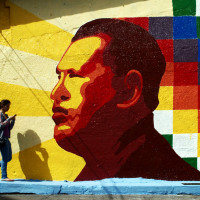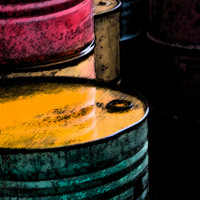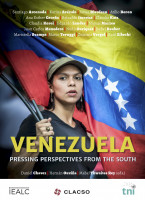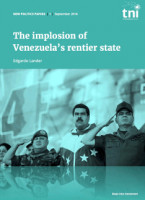Against authoritarianism and neoliberalism in Venezuela A view from the critical left
Topics
Regions
In early September 2024, several researchers and associates of the Transnational Institute held a conversation with Edgardo Lander, a TNI Fellow with a long academic career in the social sciences and a respected trajectory in the Latin American left. This conversation, edited by Daniel Chavez, aims to exchange information and analysis on Venezuela’s current political and social reality, seeking to move beyond the dogmatic, schematic and sectarian views that characterise much of the international flow of information and analysis on that country.1
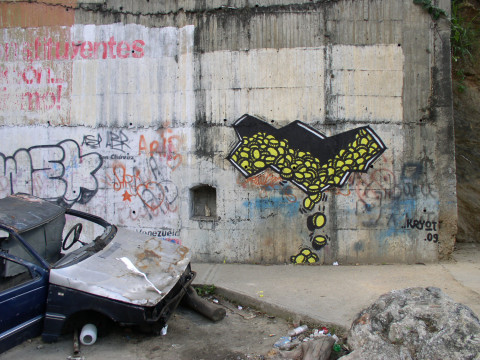
KRYOT/Flickr/CC BY-NC-ND 2.0
The coverage of the Venezuelan crisis in the international press has focused mainly on political aspects. Still, those of us who follow political development in your country know that the crisis has several other dimensions. What does the crisis mean in the current context of Venezuela, and how can we explain its recent worsening?
For the last decade, Venezuela has been suffering a deep political, economic and humanitarian crisis. Today, the country’s gross domestic product is about a quarter of what it was ten years ago. Public services – water, electricity, and telecommunications – are deficient and provided in extremely precarious conditions. Education and public health services have collapsed. The humanitarian crisis is evident, among other things, in high levels of child malnutrition and the emigration of almost eight million people, a quarter of the population, mostly young people who see no future in this country.
This profound crisis has two fundamental determinants. On the one hand, inefficiency, corruption and military control of a large part of the economy, together with the large-scale expansion of a criminal economy linked to drug trafficking and extractive activities. On the other hand, the severe economic sanctions imposed by the US government in violation of international law. The sanctions have constituted a virtual blockade that has affected the entire national economy, particularly the oil industry, which has been the country’s primary source of income for over a century. These sanctions do not significantly impact the ruling elite, but they have caused tremendous damage to the population, mainly among the most vulnerable sectors. It is difficult to determine the relative weight of these two factors separately in explaining the current crisis.
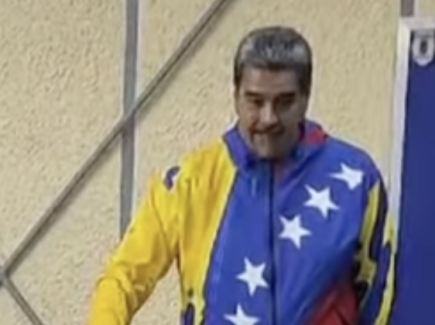
La Prensa Gráfica, CC BY 3.0 <https://creativecommons.org/licenses/by/3.0>, via Wikimedia Commons
What is the incidence of other countries’ interests in the current crisis? Recently, several newspaper articles have referred to the apparent lifting of sanctions imposed by the US government to allow Venezuelan oil to reach the European market in the context of the war in Ukraine. It has also been suggested that the US is interested in normalising relations with Venezuela for purely domestic political considerations.
The migration issue is vital to understanding the positions of other governments in the hemisphere, particularly at election time in the United States. Donald Trump has made public his intentions not only to close the borders but also to expel millions of migrants if he is elected president. This is a big problem for the Democratic Party because the rejection of migrants is very popular in some states. In relation to the massive influx of Venezuelan migrants into the country the Democratic Party aims to find alternatives to the more radical and popular options put forward by Trump. This issue has prompted Joe Biden’s administration to attempt to reduce tensions in its relations with Caracas.
Some analysts on the Venezuelan left argue that it would be better for the US government to have Maduro in power rather than anyone else, even if the alternative is a right-wing, pro-US president. Maduro would provide more guarantees of stability, a stability that matters to the United States for two reasons: the first is the assurance of Venezuelan oil exports, and the second is the migration issue. This reasoning, of course, puts aside the issue of the role of Venezuela in the global geopolitical confrontations and the threat represented to US interests by Chinese and Russian presence in the country. There is much speculation about future relations between the White House and Caracas, considering the growing pressure from Republicans in Congress to deepen sanctions and including the possible establishment of a blockade against Venezuela similar to the one imposed against Cuba. However, in any case, we must remember that Biden has not lifted US sanctions. Most sanctions are in place, with some exceptions for a few oil companies that produce a limited amount of oil in Venezuela. The exemptions have been granted for a restricted time, meaning they can be extended or reconsidered at any moment. Sanctions are a tool US administrations use to influence negotiations between the Maduro government and the opposition. No one knows what the US government will do in a few months.
After Maduro, the US government could face the reality of a Venezuelan government that is even more neoliberal than the current one, which would generate a new wave of social mobilisation. The Chavista movement is alive and still constitutes an essential part of Venezuelan society. Maduro won around 30 per cent of the vote, which means several million people. Chavismo is a well-organised political force with much experience on the streets. Some colectivos are armed and could generate a lot of instability in any transition. The US government is aware of the strength of Chavismo, in the short term, its main concern is stability. We all know that the US government’s foreign policy is not particularly concerned about democracy.
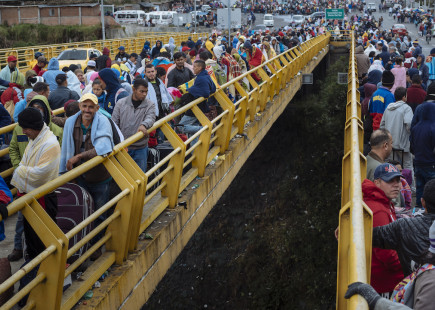
UNICEF Ecuador from Ecuador, CC BY 2.0 <https://creativecommons.org/licenses/by/2.0>, via Wikimedia Commons
Nicolás Maduro has been proclaimed president-elect of Venezuela by the country’s judicial and electoral authorities. At the same time, the opposition claims to have won the election with an overwhelming difference in votes. What explains such polarised positions?
To understand the controversies over the election result and what they reflect about the character of the current government, we must consider several issues. First, we must mention what happened before the election, starting with the appointment of a National Electoral Council (CNE) entirely controlled by the executive branch. We must also take into account the governmental intervention of most opposition parties, including the spurious appointment of pro-government party authorities. The extreme case is that of the Communist Party of Venezuela (PCV), which was part of the government coalition until a few years ago. The PCV distanced itself from Maduro after realising he was leading an increasingly neoliberal and anti-worker government. Some new members of the current leadership were not even party members, which explains why they decided to support Maduro in the recent presidential election.
The unconstitutional disqualification of opposition political leaders, stripping them of their political rights, including the right to hold public office or run as electoral candidates, must also be considered. The government has arbitrarily decided who could be accepted as a candidate and who could not, preventing many candidates from registering with the National Electoral Council. Left-wing candidates, in particular, have been prevented from registering.
After taking stock of the rejection of Maduro’s government by a large majority of the population, most opposition political parties abandoned their previous position of non-participation. Almost all political organizations in the country, both right-wing and left-wing, decided to participate in the presidential election. The current confrontation in Venezuela today is not between left and right. In the run-up to the election campaign, an extraordinary process of collective intelligence took place. An astonishing consensus was built. There was a widespread acknowledgment of the importance of this election, recognizing that what was at stake was not the program presented by the different candidates, but the shared objective of defeating Maduro to recover democracy and the 1999 Constitution. To this end, no matter how many candidates there were, it was necessary to vote for the candidate who, according to the polls and the mobilisations during the election campaign, had the best chance of defeating Maduro. This turned out to be a total unknown, a candidate nominated by the coalition of right-wing parties: Edmundo González Urrutia.
The political opposition and many social organisations in Venezuela have not hesitated to claim that the election results announced by the government are invalid. Was there fraud in the 28 July election?
The Venezuelan electoral system relies on highly dependable automated devices, with little vulnerability to fraud attempts. It has multiple controls before, during and after the electoral act. Among the control mechanisms are the minutes that report the results that the voting machine prints out at each polling station. These machine results are compared with the results from the individual paper ballots counted in the presence of witnesses from all parties. These minutes are signed by the polling station officials and by the witnesses representing the parties, who keep copies of the signed minutes. Each report has a unique QR identification code.
The machines transmit the results to a national tallying centre. When announcing the results, the CNE must present the results for each polling station so that the witnesses can compare what the tallying centre says with the tally sheet for their station. This comparison between what the tallying centre says and what the tally sheets in the hands of the polling station witnesses say is the most important control mechanism of the electoral process.
During polling day in July, government witnesses and members of the armed forces responsible for safeguarding the process put up all sorts of obstacles to prevent opposition witnesses from being present to count the results and to prevent them from obtaining copies of the polling station reports from their respective polling stations. However, despite all the obstacles, voters in most stations managed to defeat the government’s manoeuvres. On the night of voting day, when the government noticed the avalanche of votes against it, the president of the CNE interrupted the process, arguing that the system had been hacked, supposedly originating in North Macedonia. With fabricated, unsubstantiated figures, the CNE declared that Maduro had been re-elected. Even today, more than a month after the election, with a fully automated process that should have allowed the results of each polling station to be publicised the same night of the elections, the National Electoral Council still refuses to make public the results with which Maduro supposedly won the elections. In violation of the constitution, Maduro asked the Supreme Court of Justice (TSJ), which has neither the constitutional powers nor the technical capacity to do so, to ratify his victory, which the court did a few days later.
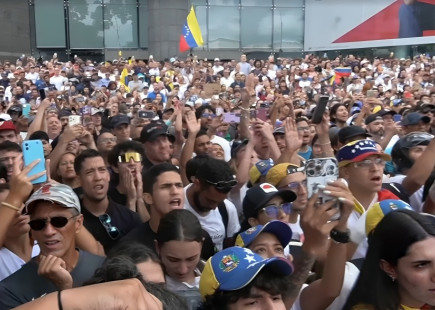
Voz de América, Public domain, via Wikimedia Commons
What happened after the election?
The Venezuelan population is widely aware of the government’s crushing defeat. Even in most polling stations located in popular neighbourhoods, which government supporters had long dominated, the opposition won. Tens of thousands of witnesses were able to verify the results at their polling stations with their own eyes. Opposition parties collected polling station reports from more than 70 per cent of polling stations nationwide. Copies of these reports were published on an easily accessible website, where it is possible to review the results of each polling station. According to these detailed tallies, the opposition candidate won over twice as many votes as Maduro.
In the face of this blatant fraud, protests erupted across the country in the two days following the elections. Unlike in previous years, when the middle class was the most visible presence in street protests, recent protests have occurred mainly among the popular sectors. The government’s response was immediate: widespread repression. 24 people were killed, mostly by police and military forces. More than 2,000 people have been arrested and charged with terrorism, including more than 100 minors. Detainees are not allowed private defence.
Today, we are witnessing the birth pangs of establishing a dictatorial regime in the country. We have witnessed a massive electoral fraud that ignores the will and sovereignty of the people. Accelerated steps are also being taken to institutionalise an authoritarian framework to impose legal mechanisms that will allow the government to indefinitely maintain control of the state. Among other laws that have been passed or are about to be passed are three harmful legislative initiatives: the anti-hate law, the anti-terrorism law and the NGO control law. Two additional laws are under discussion: the law regulating political parties and the law against fascism. Of course, it is the government that defines what is hate, what is terrorism, and what is fascism..., with accusations that it uses such tools indiscriminately against those who express criticisms. We are witnessing the transition from a government with authoritarian tendencies to a dictatorial regime.
What do you think is the significance of the current crisis in Venezuela for emancipatory thinking and ongoing debates about democracy in Latin America and the world?
An authoritarian, corrupt, neoliberal, anti-popular, repressive, patriarchal and extractivist government continues to be presented as "leftist" because of the memory of what was once, many years ago, the government of Hugo Chávez, or because Maduro sometimes (not always) has an anti-imperialist discourse. Geopolitics, as important as it is, does not explain the whole of reality. Part of the international left contributes to legitimising this government instead of what we should expect from the left: solidarity with the people who fight against an anti-democratic regime.
Those who continue to support Maduro, including parties and movements of the Sao Paulo Forum or the spokespersons of Podemos in Spain, are causing severe damage to the left in the region and the world. They are damaging anti-capitalist struggles in the broadest sense. By supporting Maduro, they are providing powerful arguments to the right. People who know what is happening in Venezuela, those who have had direct contact with some of the almost eight million Venezuelans who have left the country in recent years, have reason to conclude that “if this is the left, this is not what I want for my future, for my country, and so I am going to vote for the right”. What is happening today in Venezuela is a new test for the left, as was the Soviet Gulag in the last century, or more recently the Ortega-Murillo regime in Nicaragua.
How can a united front be built against a repressive government? What do you think are the prospects for mobilisations for democracy, considering that right-wing forces and extreme right-wing sectors seem to have so much influence in the opposition, not only in Venezuela but also internationally, including the US government and right-wing governments in Latin America and Europe?
We face a very big and challenging task, so the answer to this question is not simple. After 25 years of the Bolivarian Revolution, Venezuelan society has shifted to the right. Over the previous four decades, along with profound inequalities and exclusions, Venezuela had developed a kind of social-democratic common sense. Both major political parties supported variants of the social-democratic ideology, and key concepts such as democracy and social justice were legitimate and important to both the government and the opposition. However, after the failure of the current, self-defined “socialist” governments, Venezuelan society tends to associate any reference to socialism or the left with the corruption and authoritarianism of the Maduro government. There has been a clear shift in collective consciousness and subjectivity that questions the classic left-right divide. Today, it is tough for us on the left to appeal to the Venezuelan population with the classic language of the left. If we talk about socialism, or a left-wing horizon, our proposals are immediately rejected because people tend to identify these terms with the government’s discourse. Therefore, we find ourselves in a complicated situation and must focus our proposals on democracy, human rights and the defence of the Constitution.
In this context, the most we could aspire to in the short term is a kind of transitional government, which would surely give continuity to the current neoliberal economic policies, but with the recovery of basic democratic rights. Under the new conditions, we could focus our efforts on exercising political debate about the country we want in the recovered public sphere, on organizing and resistance to antipopular government policies, something that is not possible now. I have no expectation that in the short term, we will be able to alter the neoliberal and extractivist frameworks of the dominant political discourse (government and opposition) but also the hegemonic social imagination. A transition to democracy and recovery of the Constitution will necessarily take quite some time.
At the beginning of this conversation, you mentioned the expansion of extractivism in Venezuela. Could you explain what that means in terms of environmental justice and indigenous peoples’ rights?
The government has opened enormous areas, of the national territory to what they define as “special economic zones.” These areas constitute spaces where environmental, labor or protection of indigenous rights legislation do not apply. The priority is to extract as many natural resources as possible.
The most dramatic case is the Orinoco Mining Arc, which covers 12% of the national territory, an area that is part of the Amazon basin inhabited by various indigenous peoples. It is the main source of water in the country, with extraordinary biodiversity. These territories are being devastated as a result of massive exploitation by all sorts of illegal mining. Indigenous communities face the worst impacts, their communities and culture are disintegrating. Their children have high levels of concentration of mercury in their blood. The so-called “unions” (sindicatos), which are not workers' organizations but armed criminal organizations, control large areas of the territory and decide who can extract minerals, what minerals, to be sold at what price, without the local communities having anything to say. There is a presence of paramilitaries and Colombian guerrillas. All of this occurs with the complicity or direct participation of sectors of the national armed forces. Senior officials of these have been granted mining concessions in the area.
In the oil industry, many facilities are very old and already obsolete, with leaks everywhere as a result of poor management and lack of investment. Precisely these days, Venezuela is suffering from an oil spill that has affected more than 200 square kilometers of the Caribbean coast. The government does nothing about the spill, despite the fact that the photographs published on social networks show a huge black stain. There is no concern for nature. It is seen exclusively as a source of income.
Some intellectuals and left activists in Latin America, Europe, and other regions of the world continue to defend the government led by Nicolás Maduro, arguing that Venezuela is a typical case of a revolutionary process under attack by the global right and northern imperialist interests. Is it coherent to continue to refer to the current government as “popular”, “democratic”, or “progressive”?
This is not a left-wing government at all but an authoritarian, right-wing, and corrupt government. It is structured around – using Maduro's own words – a “civic-military-police alliance”. For years, the government has prioritised maintaining its power over the population's needs, repeatedly violating the 1999 Constitution.
Maduro’s government is a right-wing government. Its economic policies are neoliberal. The living conditions of the working class have deteriorated extremely. The monthly minimum wage is barely three dollars. To survive, the population depends on monetary bonuses and some food packages that the government hands out at its discretion, which operates as an efficient mechanism of social control. It is a repressive government; there are many political prisoners, some of them subjected to torture. The government closes down critical media, arrests journalists, social and political activists, and has deepened extractivism. There is nothing “leftist” or “progressive” in the current government.
Unfortunately, many sectors of the international left, from a “campist” perspective grounded in the Cold War that identifies imperialism exclusively with the United States, continue to think that what is happening in Venezuela is a confrontation between an anti-imperialist revolutionary government and a fascist coup supported by the empire. The real confrontation in Venezuela is, on the contrary, between an authoritarian, repressive, right-wing government with an anti-imperialist rhetoric and the vast majority of the population that spans the entire political spectrum, from left to right.
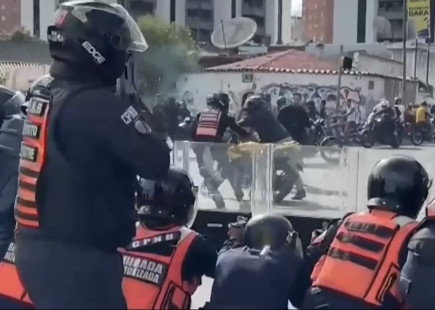
Confidencial, CC BY 3.0 <https://creativecommons.org/licenses/by/3.0>, via Wikimedia Commons
How monolithic is the military’s support for Maduro? Will the military’s support be maintained long-term, given that Nicolás Maduro has a very different charisma and political roots than Hugo Chávez?
Chávez came from the army and, therefore, knew the armed forces from the inside. Chávez led his comrades not by force or imposition but by conviction. Chávez had control of the military and knew everything inside the armed forces. That is not the case with the current president. Maduro comes from a small left-wing party – and let’s not forget that in Venezuela the left has traditionally been against the military – and had no previous relationship with the armed forces. To secure their support, he very significantly increased military participation in government posts, from ministries to the boards of state-owned companies. Corruption has been massive as a means to keep the military happy. This is not a government “backed” by the military, but, as Maduro himself has said, the government is led by a “civilian-military-police alliance”.
Some people who know more about the military than I do argue that the entire military leadership is united around the decision to protect Maduro at all costs because they are protecting their own privileges. But that is not the case with the junior commanders. Soldiers have miserable salaries, and their families share the same difficulties as the rest of the Venezuelan population regarding access to food, health, education, and transport, which is why there is discontent. In recent years, many military officers below the top echelon have been arrested and accused of conspiring against the government. Still, the top military commanders seem to be united in their backing of Maduro.
What is the role of the press and other media in the current Venezuelan context?
The traditional media – newspapers, radio and television stations – are under government control. The government closed some media and bought others. Only one national daily printed paper has survived, Útimas Noticias. and it is totally controlled by the government. All other national newspapers have disappeared or are only published online.
Overall, today traditional media play a much less significant role. People communicate mainly through social networks such as Facebook or TikTok. However, not everyone has easy access to social networks, and some of these are blocked by the government indefinitely or intermittently. Aporrea, the online portal that has been one of the main channels of communication and debate for the critical left for the last two decades, requires a VPN to access, which means the exclusion of many people who do not know how to do so. Many community radio stations that were created during the Hugo Chávez government have either been shut down by the government or have closed due to the lack of the basic resources required for their operation.
Social media are chaotic, we all know it. They can be easily manipulated. Insults come and go and an enormous amount of fake news or misinformation circulate. If we want something to be debated within the left, we have to publish it in media with limited coverage like Aporrea. When we see how many people have accessed a certain text, one can be happy if it gets 3,000 readers, but 3,000 in a country of 30 million is nothing.
The government controls the traditional media, and since the elections, it has used them to sell the notion of “normality”. The government wants to convince people that the election is over, that Maduro has won, and that everything is back to normal. They constantly publish images of people shopping and pretending that nothing unusual has happened, trying to show that the discontent does not exist.
How strong, or rather how weak, is the Venezuelan left? You mentioned earlier the government’s intervention of the Communist Party and the appointment of an illegitimate party leadership, but what can you say about the Chavista left?
The left in Venezuela is very weak today. It is also a fragmented and internally diverse left. An important component includes people who 20, 10 or 5 years ago had been part of the Bolivarian Government or backed that government and who have distanced themselves from Maduro. It is not always easy to work together with people who, until recently, were in power or complicit in government decisions that we opposed. Regaining trust is an effort, but it is a process that we must take seriously in order to work together on the shared priority. Many of the civilian ministers and other state officials during the Hugo Chávez governments now oppose Maduro. As the recent elections demonstrated, the government also has limited support from its popular bases. The military, and the police, remain the mainstay of the current government.
I would like to insist on the fact that like many other countries in Latin America, Venezuelan society as a whole has shifted to the right during the Bolivarian governments. However, some of us, left activists, are still trying to meet and work together. We have to meet on Zoom, because organising public and open political meetings is unsafe. There is a shared conviction that we need to rebuild trust, beyond the political differences we had until recently. We must leave behind those differences and those past interpretations of the Bolivarian process to focus on our common goal, which is the recovery of the Constitution. I have many criticisms of the Constitution itself, but of course, that is not the main issue today. Today's main task is to recover constitutional institutions, the exercise of politics and the public sphere. Once we recover democracy, we can talk about other more profound social, economic and political transformations, but today is not the time for those debates. Today, we have to start with getting the victims of repression out of detention centres and focusing our actions on respect for human rights and the basic principles of democracy.

